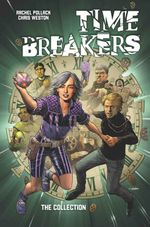Doom Patrol
★★★★☆
An absurd, character-focused, darkly humorous, psychological take on people with the super-power/body horror combo.
The title sequence sets the tone perfectly with Dave McKean-style imagery and music that sounds like the His Dark Materials theme as played by Garbage.
They start out playing up some of the X-Men similarities (the original comics for both debuted almost simultaneously). Costumes and code names mostly don’t show up until a couple of seasons in. (Though Rita seems to have a fondness for red and white outfits.)
Mostly it’s just weird.
The first two seasons are strongest. After that it gets very uneven.
Characters
Aside from Cyborg, “Crazy Jane” – the one with 64 personalities (each with its own super-power) – is the most stable and even-keeled of the bunch. Rita, Larry and Cliff spend decades hiding from the world in Niles Caulder’s oversized mansion (the fact that they haven’t aged isn’t acknowledged until at least the second season), in various forms of depression.
Putting Cyborg in the Doom Patrol instead of the Titans is a bit of an odd fit at first. He’s from the brighter side of the DCU, and an actual super-hero in this world. But he’s always had a streak of insecurity (at best) about his transformation and what he feels he’s lost of his humanity. Even the Teen Titans cartoon had that “repairs are not yet complete” episode. So he ends up being simultaneously a foil for the rest and still being one of them. It’s especially interesting to compare him to Cliff, who’s only a brain in a robot body at this point.
Rita Farr is an interesting case, since the Doom Patrol run that most directly informs the show is Grant Morrison’s…in which she wasn’t a member, having been killed years before. My knowledge of the comic book version mostly comes from the 1980s run of The New Teen Titans, in which she’s Gar Logan’s fondly-remembered dead adoptive mother. I do remember that she mainly had stretching powers in the comics, and thought of herself as a freak after gaining them. Which kinda worked in the 1960s, but doesn’t work for the 2010s. Giving her uncontrolled powers here, such that when she gets upset she starts melting into a blob, fits the tone of the show and justifies her self-loathing more effectively.
(In theory the whole team was killed off in the comics of the 1970s, but by the time Morrison picked it up, everyone except Rita had turned out to still be alive.)
Specifics
Cliff seeking a father-daughter relationship with Jane (not realizing at first how horrible her own father was), then finally working up the nerve to get in touch with his family. (And I must say, Brendan Fraser is perfect for the role.)
Rita is such fun as sort of a glamorously-drunk den mother.
Larry coming to terms with the fact that he skipped out on the decades-long struggle for gay rights - today (well, in the late 2010s, anyway) he could be himself, if he wasn’t radioactive and bonded to an alien creature.
It’s fascinating to see a storyline in which Vic actually regains his human appearance for an extended period of time, and ultimately chooses to reactivate his tech, appearance and all.
I got so tired of the butts.
The obligatory musical episode, “Immortimas Patrol,” was…not very good. With the exception of “The Elements of Love,” a well-performed dance number full of chemistry puns. (Weirdly enough, I ended up watching it in the same week as one of the Magicians musical episodes and “Subspace Rhapsody,” which was a lot more fun. Of course Star Trek is all about people who are competent at what they do, and Doom Patrol is the opposite. Including, as it turns out, music.)
The last scene (Cliff and the vision of the future) was a perfect bittersweet coda to the whole show.

